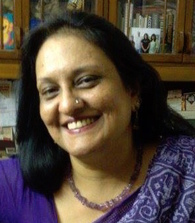|
I don’t know why my father decided to take the trip to Nainital by road, driving our white Ambassador in the middle of June. June was when we had our summer holidays, and that was the time we went to a hill-station for a few weeks, to spend family time together, enjoy the pleasant mountain air away from the intense Delhi heat, and generally return feeling we had done something other than chilling inside our cool bedrooms reading books and listening to music and eating stuffed potato paranthas made by Mom to pass vacation time. Now the Ambassador car is a family car, made to accommodate big Indian families, and three fat people can sit comfortably at the back. The driver can sit with two people next to him. Beyond that, even the Ambassador’s accommodating abilities are stretched. We were Dad (slim) driving, Mom (plump), three sisters of various ages from 12 to 9 (slim) of which I was one, a brother about 3 year old, and an Ayah whose body was equivalent to 2, and a half more, people. So we just about fitted in. It was not comfortable, especially for a long journey of about 300 kms, with the latter part of it over snaky mountain roads. However, before we came to the hilly roads, we had to tackle the plains. This was travel over undeveloped and bumpy roads for a large part. Travel by road was not such a popular ‘thing to-do’ in the days of my childhood. The cars, Ambassadors and Fiats, did not come with air-conditioners. We were seated asscheek-to-jowl, to stretch a figure of speech. It was hot, humid, and the pre-boiled and cooled drinking water in our plastic bottles was now near-boiling again. Dad did not believe in Coca Cola as a healthy drink, and the cold lemonade mother had in a couple of flasks for us, soon finished. We ate our packed, home-cooked ‘puri-aloo’ meal, and tried to make the best of it as Dad, his face flushed and hot under the afternoon sun, grappled with the roads of U.P., avoiding potholes and dirt roads as far as possible. We did not enjoy nor approve of this form of travel, but we could not protest. Mid-journey, I was tired, and put my head on Ayah’s shoulder to doze off. She already had my little brother on her lap and could not accommodate my head on her shoulder. She gently asked me to straighten up. Dad, squinting at the road, rivulets of sweat running down his eyes and cheeks, said, “There is no need for you to lean on her. Learn to be strong.” I straightened up and suffered, not leaning on any shoulder. It was a horrendous drive, but we did it then. Now, when we whizz across well laid out routes with air-conditioned cars being the norm rather than the exception, I think about this particular foray of ours and marvel at it. The skating, horse-riding, and sailing on Naini Lake made me forget the ordeal of getting there at that time. But I have not forgotten my father’s words.  Abha Iyengar is an award winning, internationally published poet, author, editor, translator, and a British Council certified creative writing mentor. Her story, The High Stool, was nominated for the Story South Million Writers Award. She received the Lavanya Sankaran Writing Fellowship for 2009-2010. Her poem-film, Parwaaz, won a Special Jury prize in Patras, Greece. She was a finalist in the FlashMob 2013 Flash Fiction contest. Her short fiction, The Marshlands, was shortlisted in the DNA-Out of Print short story contest 2015. Her poems have appeared in the Anthology of Contemporary Indian Poets and her fiction in The Indo-Australian Anthology of Short Fiction. Her published works include Yearnings, Flash Bites, Shrayan, Many Fish to Fry and The Gourd Seller and Other Stories.
0 Comments
Leave a Reply. |
StrandsFiction~Poetry~Translations~Reviews~Interviews~Visual Arts Archives
April 2024
Categories |
 RSS Feed
RSS Feed